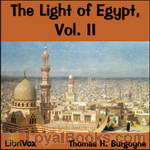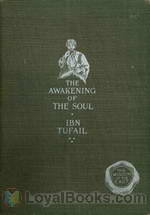|
Books Should Be Free Loyal Books Free Public Domain Audiobooks & eBook Downloads |
|
|
Books Should Be Free Loyal Books Free Public Domain Audiobooks & eBook Downloads |
|
Philosophy Books |
|---|
|
Book type:
Sort by:
View by:
|
By: Mary Wood-Allen (1841-1908) | |
|---|---|
 Almost A Man
Almost A Man
| |
By: St. George William Joseph Stock (1850-) | |
|---|---|
 Deductive Logic
Deductive Logic
| |
 Guide to Stoicism
Guide to Stoicism
This book is a primer on the philosophy of stoicism, resurrected from its origins in Greek and Roman philosophy. The original philosophy was based on a reasoning process which it was assumed would lead to a virtuous life. Zeno, the founder of stoicism, did not begin expounding on its teachings until he was in his forties. He believed that the purpose of life was "to live consistently." Cleanthes, his disciple, added "with nature," so that the purpose of life became "to live consistently with nature." | |
By: Carveth Read (1848-1931) | |
|---|---|
 Logic Deductive and Inductive
Logic Deductive and Inductive
| |
By: Frederick James Furnivall (1825-1910) | |
|---|---|
 Early English Meals and Manners
Early English Meals and Manners
| |
By: George Stuart Fullerton (1859-1925) | |
|---|---|
 An Introduction to Philosophy
An Introduction to Philosophy
| |
By: Harry A. Lewis | |
|---|---|
 Hidden Treasures
Hidden Treasures
"Some succeed while others fail. This is a recognized fact; yet history tells us that seven-tenths of our most successful men began life poor." A selection of mini-biographies teaches us how some successful men have overcome odds to make their mark on history. | |
By: Thomas H. Burgoyne (1855-1894) | |
|---|---|
 The Light of Egypt, vol II
The Light of Egypt, vol II
"The Light of Egypt" will be found to be an Occult library in itself, a textbook of esoteric knowledge, setting forth the "wisdom Religion" of life, as taught by the Adepts of Hermetic Philosophy. It will richly repay all who are seeking the higher life to carefully study this book, as it contains in a nutshell the wisdom of the ages regarding man and his destiny, here and hereafter. The London and American first edition, also the French edition, Vol. I, met with lively criticism from Blavatsky Theosophists, because it annihilates that agreeable delusion of "Karma" and "Reincarnation" from the minds of all lovers of truth for truth's sake. | |
By: Leslie Stephen (1832-1904) | |
|---|---|
 The English Utilitarians
The English Utilitarians
| |
 Social Rights and Duties, Volume I (of 2) Addresses to Ethical Societies
Social Rights and Duties, Volume I (of 2) Addresses to Ethical Societies
| |
By: Thomas Troward (1847-1916) | |
|---|---|
 The Doré Lectures being Sunday addresses at the Doré Gallery, London, given in connection with the Higher Thought Centre
The Doré Lectures being Sunday addresses at the Doré Gallery, London, given in connection with the Higher Thought Centre
| |
By: Henry A. Beers (1847-1926) | |
|---|---|
 Four Americans Roosevelt, Hawthorne, Emerson, Whitman
Four Americans Roosevelt, Hawthorne, Emerson, Whitman
| |
By: John Dee (1527-1608) | |
|---|---|
 The Mathematicall Praeface to Elements of Geometrie of Euclid of Megara
The Mathematicall Praeface to Elements of Geometrie of Euclid of Megara
| |
By: Muhammad ibn 'Abd al-Malik Ibn Tufayl (-1185) | |
|---|---|
 The Improvement of Human Reason Exhibited in the Life of Hai Ebn Yokdhan
The Improvement of Human Reason Exhibited in the Life of Hai Ebn Yokdhan
| |
 The Awakening of the Soul
The Awakening of the Soul
| |
By: Henry Drummond | |
|---|---|
 The Greatest Thing in the World and Other Addresses
The Greatest Thing in the World and Other Addresses
The spiritual classic The Greatest Thing In the World is a trenchant and tender analysis of Christian love as set forth in the thirteenth chapter of I Corinthians. The other addresses speak to other aspects of Christian life and thought. | |
 Addresses
Addresses
| |
By: David Starr Jordan (1851-1931) | |
|---|---|
 The Philosophy of Despair
The Philosophy of Despair
| |
By: James Cardinal Gibbons (1834-1921) | |
|---|---|
 The Faith of Our Fathers
The Faith of Our Fathers
The Faith of Our Fathers: A Plain Exposition and Vindication of the Church Founded by Our Lord Jesus Christ is a book published in 1876 by archbishop James Gibbons, which became a best-selling conversion manual in the United States, and by 1980 was in its 111th printing.(From the preface) “The object of this little volume is to present in a plain and practical form an exposition and vindication of the principal tenets of the Catholic Church. It was thought sufficient to devote but a brief space to such Catholic doctrines and practices as are happily admitted by Protestants, while those that are controverted by them are more elaborately elucidated... | |
By: George Horace Lorimer (1869-1937) | |
|---|---|
 Old Gorgon Graham More Letters from a Self-Made Merchant to His Son
Old Gorgon Graham More Letters from a Self-Made Merchant to His Son
| |
By: Julia M. Grundy (b. 1874) | |
|---|---|
 Ten Days in the Light of Acca
Ten Days in the Light of Acca
This work is the story of a pilgrimage made over a hundred years ago by a group of American pilgrims. They were not headed for Canterbury, Rome or Jerusalem. Rather, they were headed for an historical but remote prison-city in a far corner of the Ottoman Empire. ‘Akká (Akko), now a city in Israel which attracts thousands of Bahá’í pilgrims each year, was but little thought of in that early period. It was originally the final place of exile and imprisonment for Bahá’u’lláh, a Persian nobleman who proclaimed that He was the Promised One of all religions and Messenger of God for this day and age... | |
By: William Graham Sumner (1840-1910) | |
|---|---|
 What Social Classes Owe to Each Other
What Social Classes Owe to Each Other
| |
By: Winfield Scott Hall (1861-) | |
|---|---|
 The Biology, Physiology and Sociology of Reproduction Also Sexual Hygiene with Special Reference to the Male
The Biology, Physiology and Sociology of Reproduction Also Sexual Hygiene with Special Reference to the Male
| |
By: Frederic W. Farrar (1831-1903) | |
|---|---|
 Seekers after God
Seekers after God
| |
By: Mary Mills Patrick (1850-1940) | |
|---|---|
 Sextus Empiricus and Greek Scepticism
Sextus Empiricus and Greek Scepticism
| |
By: Charles Francis Adams (1835-1915) | |
|---|---|
 "'Tis Sixty Years Since" Address of Charles Francis Adams; Founders' Day, January 16, 1913
"'Tis Sixty Years Since" Address of Charles Francis Adams; Founders' Day, January 16, 1913
| |
By: Walter Cox Green | |
|---|---|
 The Book of Good Manners; a Guide to Polite Usage for All Social Functions
The Book of Good Manners; a Guide to Polite Usage for All Social Functions
| |
By: Richard W. Church (1815-1890) | |
|---|---|
 Bacon
Bacon
This investigation of Bacon the scholar and man of letters begins with a look at the early days ang progresses to his relationships with Queen Elizabeth and James I. It includes accounts of his positions as solicitor general, attorney-general, and chancellor. The book concludes with Bacon's failure, his overall philosophy, and summaries of his writings. | |
By: Ralph Barton Perry (1876-1957) | |
|---|---|
 The Approach to Philosophy
The Approach to Philosophy
| |
 The Moral Economy
The Moral Economy
| |
By: Mírzá Abu’l-Fadl Gulpáygání (1844-1914) | |
|---|---|
 The Brilliant Proof (Burhäne Lämé) in reply to an attack upon the Bahai Revelation by Peter Z. Easton
The Brilliant Proof (Burhäne Lämé) in reply to an attack upon the Bahai Revelation by Peter Z. Easton
“In these days,” writes the renowned Bahá’í scholar, Mírzá Abu’l-Fadl, “which are the latter days of 1911, A. D. and the early days of 1330 A. H., I have seen a curious article which astonished me. What did I see? I find that one of the missionaries of the Protestant sect, who accounts himself among the learned men of the twentieth century, a helper of the pure religion of Christ and one of the civilized and cultured occidentals, by name, Peter Z. Easton, has been so provoked by jealousy... | |
By: George John Romanes (1848-1894) | |
|---|---|
 Mind and Motion and Monism
Mind and Motion and Monism
| |